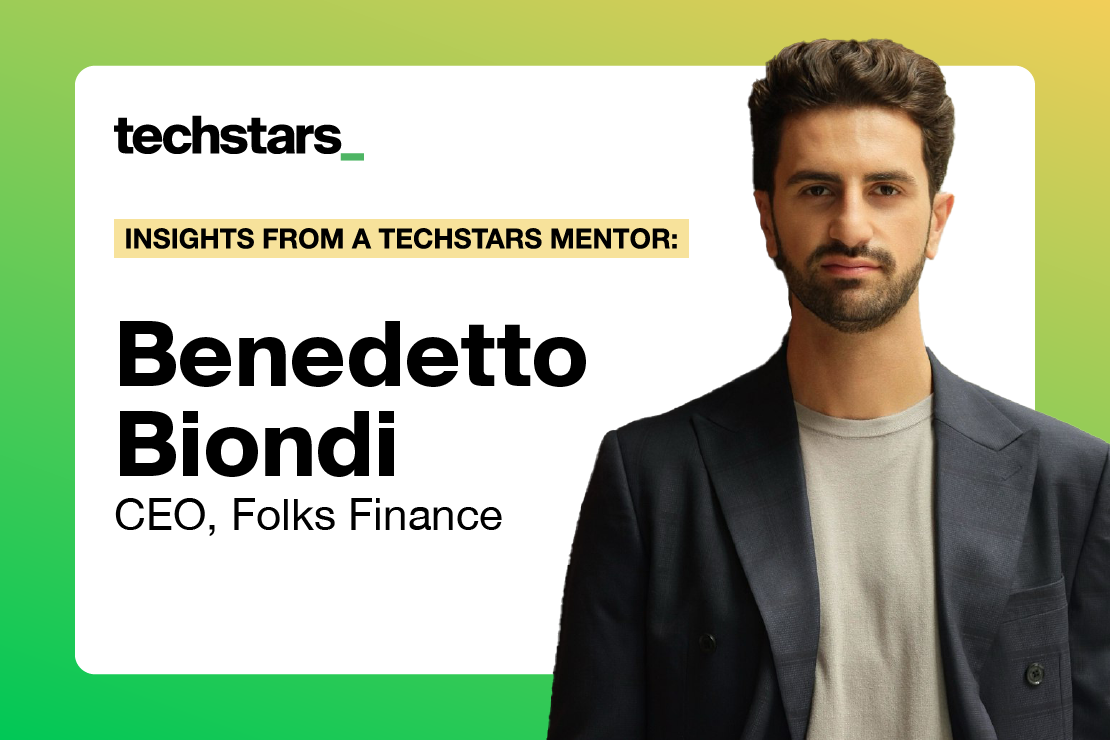Folks Finance CEO and Techstars Mentor Benedetto Biondi on Staying Nimble and Adapting to New Technology
Jan 16, 2025

In the rapidly evolving world of decentralized finance (DeFi), adaptability and foresight are essential for success. Benedetto Biondi, CEO of Folks Finance and Techstars Mentor, has positioned his company as a pioneering force in the DeFi ecosystem by anticipating industry trends and embracing technological innovation. In this exclusive Q&A, Biondi shares how his leadership style, risk management strategies, and carefully cultivated team culture have helped Folks Finance stay ahead in a competitive market.
How do you maintain a competitive edge in a fast-moving industry like DeFi?
Staying competitive means staying curious. We encourage our team to be perpetual learners, actively tracking industry trends and dedicating time during work hours to explore Web3 developments that spark their interest. Bi-weekly knowledge-sharing calls, dedicated research periods, and a well-organized team structure ensure that every department — whether marketing, operations, or technical development — remains aligned while continuously expanding their expertise. This approach helps us balance immediate goals with long-term innovation. Personally, I absorb as much as I can from conferences, industry events, and my network of peers. Flexibility and a hunger for knowledge are our strongest assets.
Can you share an example of a significant pivot Folks Finance had to make to adapt to new technological trends?
For us, Folks becoming the leading DeFi app on a single network (Algorand) was not the final goal, and we decided to look towards a multi-network expansion. However, we realized that simply replicating our product on another blockchain would create isolated versions of the platform, limiting scalability and efficiency. Instead, we pivoted and committed ourselves to launching a novel solution — something that did not yet exist in the market — to solve the network isolation problem. This was a pivotal decision that required over a year of research and development, but it allowed us to offer multichain interoperability which would not have been possible otherwise.
How do you approach risk when integrating relatively immature technologies into your platform?
In DeFi, taking risks is essential to stay competitive, but the risks must be calculated and mitigated. When integrating new technologies into the Folks platform, we set strict risk parameters that safeguard the protocol from incidents that can be related to third parties. For example with the integration of messaging layers, we decided to add parameters that limit the amount of capital that can be transferred between two networks within specific timeframes. Innovation without risk is impossible, but installing thoughtful safeguards allows us to push boundaries responsibly.
In such a rapidly evolving industry, how do you decide which new technologies are worth exploring?
We adopt a multi-layered approach to exploring new technologies. First, we encourage internal brainstorming and conduct technical feasibility studies. Then, we tap into our core community of experts for confidential testing and feedback.
I also make it a point to personally gather market intelligence by attending industry conferences and speaking with other founders. If there’s a clear market demand and the technology aligns with our long-term vision, then we pursue it.
How do you foster a culture of innovation within your technical team?
Creating an open environment where everyone feels empowered to share ideas is key. Critical thinking is highly encouraged, and no one should feel hesitant about proposing improvements. We reward proactive contributions and ensure that team members understand how their input directly impacts the platform’s success. If someone isn’t aligned with this mindset, they typically don’t stay with us long.
How has your leadership style evolved while managing a team in such a high-tech, fast-paced environment?
My leadership style has matured significantly since founding Folks Finance. Early on, I was perhaps too informal with new team members, which sometimes led to a lack of mutual respect. Over time, I learned to strike a balance between being approachable and maintaining professional boundaries. I aim to be a supportive leader, not a rigid boss, and I value open communication and direct feedback from my team.
I now prioritize creating an open environment where everyone feels empowered to respectfully share ideas. I push our team to think critically and I work to ensure no one feels hesitant about proposing improvements. I also make an effort to reward proactive contributions and ensure that team members understand how their input directly impacts the platform’s success.
What advice would you give to entrepreneurs building products in fast-paced, emerging industries?
I’d tell young entrepreneurs to be adaptable and leverage market cycles. For example, a bull market is the right time to fundraise and scale quickly.
However, before investing heavily in an idea, entrepreneurs need to do the research to ensure there’s a strong product-market fit. Many founders fall in love with their vision without testing whether the market truly needs their product. Entrepreneurs need to be both visionary and realistic — test concepts early and adjust based on honest feedback from trusted friends and advisors.
